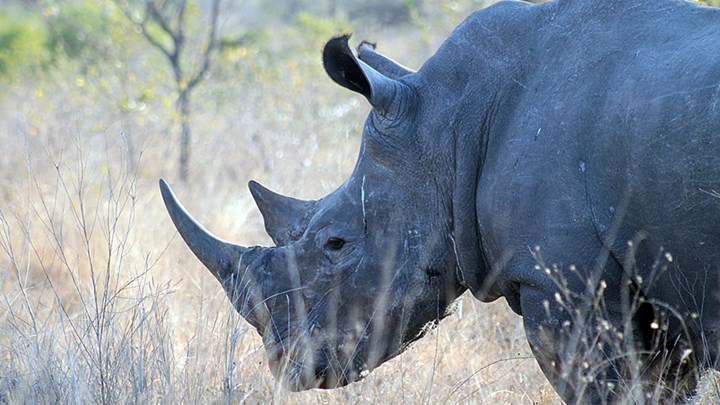
by Erin C. Healy - Wednesday, April 10, 2019

Officials at Kruger National Park in northeast South Africa confirmed in multiple news reports that on Apr. 2 three men were attempting to poach rhinoceros when one in their party was trampled by an elephant. The two surviving poachers said they dragged the man’s body to a road so his family could retrieve his remains. They then informed the family of what had happened. The family notified park officials and a search commenced. The first day nothing could be found. More information was sought from the accomplices and on the second day the man’s remains where located: his skull and some cloth from his pants. A pride of lions is known to prowl the area in which the remains were found and it is assumed that lions ate the body.
The Associated Press reported that park spokesman Isaac Phaahla said, "Poaching is a serious, ongoing problem in the park.” He added, “On most days we have close to 15 poaching groups of three individuals each who are hunting illegally for rhinos.” Kruger spans 7,500 square miles, which ranks between the size of New Jersey and Massachusetts. South Africa is home to approximately 80 percent of the world’s rhinos, and poaching pressure has skyrocketed there in recent years due to the large sums of money that can be made on the Asian medicinal market. Ground rhino horn and ground lion bones—a substitute for tiger bones—are used in the making of traditional Chinese medicine. Phaahla concludes by saying, “Our rangers are well-trained and making progress in controlling the poaching.”
If so, that would be a bright light in a dim situation. Often hunters and poachers are confused by the public and animal rights extremists use that misunderstanding in their emotionally charged push to end all hunting. The hunting community must do all it can to combat a complex issue that involves numerous jurisdictions, law enforcement agencies, trade agreements, countries and cultures. This is why the NRA Hunters’ Leadership Forum is leading the effort by hosting a five-member panel seminar at the 148th NRA Annual Meeting and Exhibits in Indianapolis, Apr. 26-28.
“Fighting Poaching: How the Hunting Community Can Stem the Tide” will be moderated by NRAHLF.org Content Chief Karen Mehall Phillips and NRA HLF Co-Chair Ward “Trig” French. The five panelists will discuss poaching from their boots-on-the-ground experience both domestically and internationally.
BILLY BIRDZELL, a U.S. Marine Corps infantry officer, U.S. Special Operations team leader and author, specializes in training anti-poaching units in Africa.
COL. CRAIG BODDINGTON, USMC Reserves, Retired, is a nationally-known outdoor writer and wildlife conservationist, author of dozens of books and hundreds of articles, and anti-poaching activist especially relating to African big game.
JOHN BORKOVICH, occasional contributor to the NRA Hunters’ Leadership Forum website, NRAHLF.org, is an awarded and accredited wildlife conservation officer, author, and nature and conservation specialist.
IVAN CARTER is an African professional hunter and world-renowned TV host of Carter’s W.A.R. on the Outdoor Channel. He is on the front lines in Africa fighting poaching and promoting wildlife conservation issues continentwide, especially relating to the poaching of elephants for their ivory and rhino for their horn.
CATHERINE SEMCER is a regular contributor to the NRA Hunters' Leadership Forum website, NRAHLF.org. She is a worldwide speaker and debater on hunting issues with boots-on-the-ground experience in fighting poaching in Africa through work as a professional wildlife conservationist with H.O.P.E. (Humanitarian Operations Protecting Elephants) as well as a research fellow with the Property and Environment Research Center (PERC), which focuses on free-market- and property-rights-based solutions to policy challenges in environmental security, conservation finance and sustainability.
For days now, the Internet has been abuzz with the karmic righteousness of this animal-kills-poacher story. But, in actuality, the editorial board of the Chicago Tribune got it somewhat right: “Poetic Justice for a rhino poacher is nothing to feel good about.” First, a man is dead and his family is grieving. “The details speak not to a rich man’s pleasure hunt gone bad but to a low-level actor in a global trade in rhino horn and elephant ivory.” Being angry about poaching is understandable, but gloating over this death doesn’t make a difference. “The answer globally is a stronger commitment to making and enforcing anti-poaching laws, plus investing in education,” writes the board it its editorial.
The NRA HLF is doing just that with this seminar. We’ll see you at 1:30 p.m. on Sat., April 27 in Indianapolis.
Editor's Note: In supporting the NRA in its efforts to promote legal, regulated hunting, the NRA Hunters’ Leadership Forum website continues to reach out to the general public and explain that poaching is not hunting and poachers are not hunters. As poaching escalates near Kruger National Park (KNP) and along the border of South Africa and Mozambique, last February NRAHLF.org helped to break the story when African lions devoured a suspected poacher near KNP. According to police reports coming out of South Africa, remains of the believed-to-be poacher’s body were discovered next to a loaded rifle and ammunition at a private game park in Limpopo, the country’s northernmost province. Read how hunters’ dollars are sustaining anti-poaching efforts in Africa. —Karen Mehall Phillips
About the author: Erin C. Healy is the associate editor of the NRA Hunters' Leadership Forum. She edited a lifestyle magazine on Cape Cod for 14 years and provided marketing services for her local guntry club prior to joining BLADE magazine. She served in the U.S. Army, is an NRA Life Member, a National Wild Turkey Federation member and sends her Jack Russell Terriers to ground as often as possible.
Follow NRA Hunters' Leadership Forum on Twitter @HuntersLead.
E-mail your comments/questions about this site to:
[email protected]
Proudly supported by The NRA Foundation and Friends of NRA fundraising.
